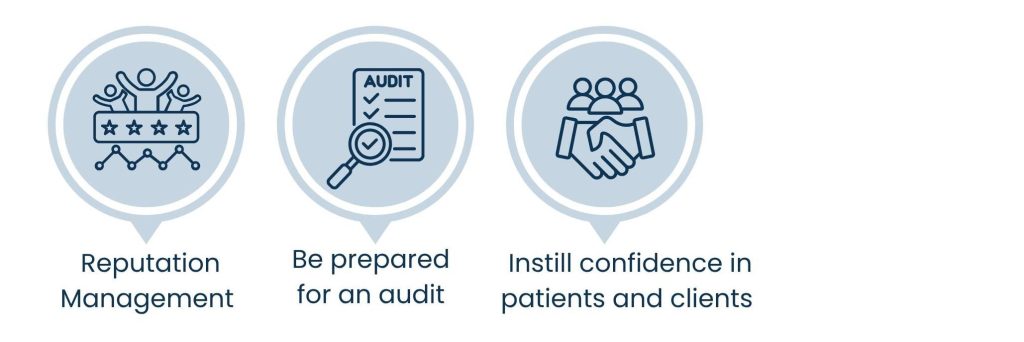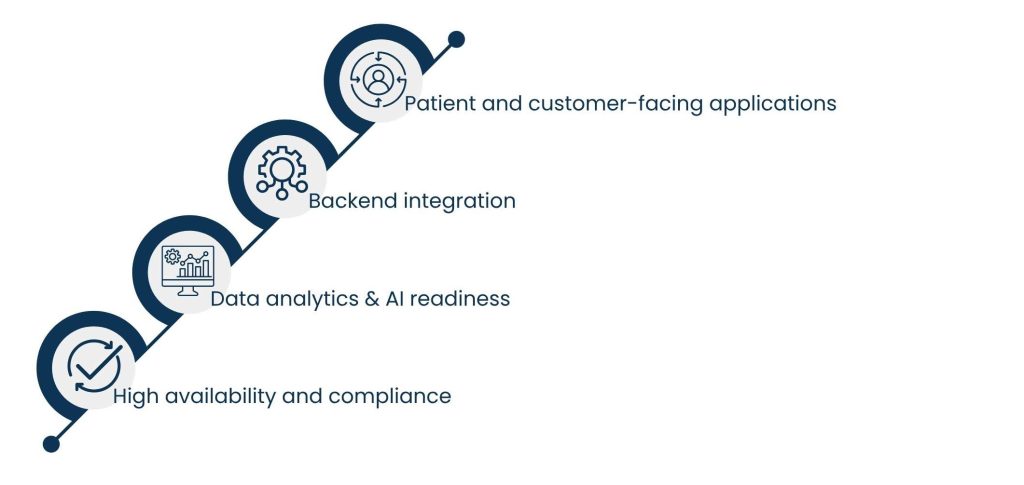Introduction
The Cloud Advisory Service is a trusted advisor to healthcare and financial institutions to aid their secure, compliant, and cost-effective cloud decision-making. They work in heavily regulated industries in which data sensitivity, auditability, and uptime are not matters of negotiation. And while general cloud approaches can provide the necessary security, a tailored advisory approach aligns services with industry regulations such as HIPAA, PCI DSS, or SOX.
Healthcare facilities need to protect patient information, and yet they need their providers to have easy access. Financial institutions must be able to process transactions with security and traceability. An industry-specific cloud advisory team is instrumental in bridging the gap between contemporary infrastructure and compliance requirements.
Cloud decisions have long-term implications as legacy technology co-exists with growing needs for scalable services, such as telehealth or digital banking. This is where specialized cloud consulting provides the greatest value: phased migrations, hybrid strategies, and lean architectures that enhance performance with compliance.
From identity management to disaster recovery, there’s a context for every cloud decision. A proven Cloud Advisory Services read on A trusted provider in that context, with which to integrate an enterprise cloud strategy and competencies around compliance, resilience, and cost control— this time supported by expertly delivered cloud security advisory services.
Compliance Is Non-Negotiable Under Cloud Advisory Service
The healthcare and finance industries are made up of sensitive, high-stakes data. Records of patients’ health and financial transactions aren’t simply business assets. Hence, they are covered by some of the world’s most restrictive compliance laws. This is where a dedicated Cloud Advisory Service is crucial. These specialists know the intricate regulatory environment and company by embedding compliance into every layer of their cloud stack from day one.

Why this matters:
1. Reputation Management:
You will be fined and prosecuted when you fail to obey laws like HIPAA, PCI DSS, GDPR, and SOX. Additionally, it can ruin your good name as someone who can be a trusted entity. This real risk can be averted with a secure and privacy-sensitive cloud implementation, an item that a Cloud Advisory Service offers.
2. Be prepared for an audit:
With integrated compliance, you sidestep the desperate audit scramble. Continuous documentation checks and configuration ensure that systems remain up to regulatory standards.
3. Instill confidence in patients and clients:
Data breaches or failure to adhere to regulations reduce public trust. When you’re always compliant, you’re sending a clear message that your company is serious about security and responsibility.
A generalized cloud consulting service says that they understand best practices, but a specialized advisory team understands how to turn regulations specific to the industry and specialty into a technical strategy that will be effective. For example, with healthcare, it is not just rest data that needs to be encrypted but also PHI data in transit between systems. In the finance world, everybody wants to have audit trails and immutability of data in any cloud logging system.
A solid Cloud Advisory Service determines how cloud services, such as IAM, KMS, Config etc can be used given your regulatory landscape, adds tools and processes to assist and monitor you into secure maturity without preventing you from working. This includes setting up role-based access, automating compliance monitoring, having security enforced data back-ups and creating processes that can scale and change with new regulations.
In industries where the smallest of misconfigurations or errors could lead to a serious compliance breach or fine, generally, complying is not a nice-to-have; it is foundational. That is what trust-aware, expert-led cloud security advisory services aim to deliver. When compliance is the foundation of all that you do, your cloud risk goes away while you create a strategic bastion and launch from a secure cloud computing posture.
Also Read: Data Entry Virtual Assistant
Cloud Advisory Service Considers Data Security Is Not Just a Priority but a Mandate
And in certain sectors of the economy, including in health care and in finance, data breaches are not just technical failures, but are legal liabilities and public trust catastrophes. From patient records to financial transactions and identity information, the data that these industries handle is highly sensitive. That’s why a specialized Cloud Advisory Service not only suggests security measures but also integrates security into the architecture as the foundation.

Why this matters:
1. Encryption from one end to the other:
There should be no way for sensitive data to be exposed while at rest or in motion. A scalable infrastructure advisor validates encryption measures for HIPAA, PCI DSS, and other mandates.
2. Granular access controls:
Healthcare and financial data should be accessed only by approved individuals. Cloud advisers set up strong Identity and Access Management roles with MFA and rule-based access.
3. Real-time Detection:
A cloud advisory team establishes ongoing audit systems with automatic alerts and action with tools such as GuardDuty and Security Hub.
4. Data Loss Prevention:
Back-up, versioning, and geo-redundant strategies are built into keep your data safe and recoverable. Hackers can’t truly delete your data
5. Multi-layered security:
Stackery uses many layers of defense to protect your applications and data from breaches and attacks.
Generic cloud advice may provide a general level of protection, but industry-based security relies on a deep understanding of threat models and compliance needs. For example, one hospital must keep its data secure from ransomware attacks that might take down core systems. A bank needs to protect itself from insiders who threaten to expose customers’ data.
This is where cloud security advisory services deliver true value – by melding cybersecurity knowledge with a deep knowledge of your sector to strengthen systems where it counts the most. From authoring VPCs (Virtual Private Clouds) set up with tight security groups to securing APIs for data shared between services, everything is designed to be “defensible by design”.
For startups and large companies alike, securing data isn’t simply a matter of setting up firewalls; it’s the process of designing a system that takes into account risks, moves nimbly in response to attacks, and proves its resilience in the face of cyber threats. We’re not talking about one-size-fits-all security but integrating encryption, automated monitoring, secure storage, and stringent access controls into business as usual, as well as compliance requirements.
A custom Cloud Advisory Service makes data security go from a reactive approach to being the foundation of a proactive initiative. In industries where a single breach could shut down operations or result in liability lawsuits, it’s not just good security that you need; you need the right strategy from people who know your space.
Old Systems Need Smart Integration, Not Disruption
In health care, as in finance, legacy systems continue to run important core operations, from electronic health records to decades-old banking systems. These systems contain mission-critical data, but they weren’t designed for the cloud era. A basic lift-and-shift strategy just won’t cut it. That’s why a digital infrastructure is all about intelligent phased integration—upgrading without disrupting daily business.

Why this matters:
1. Reduce Downtime:
For hospitals and banks, an hour of pause can mean compromised care or lost cash. Cloud consulting services craft hybrid architectures that allow legacy systems and new native apps to work together until a full migration is feasible.
2. Data security at the time of migration:
Cloud consulting firms make use of secure data transfer protocols, real-time data replication, and consistency checks to ensure that no data is lost or compromised during migration.
3. Tailored Transformation:
No two legacy environments are the same. A Cloud Advisory Service figures out what to store, what to upgrade, and how to link it all up painlessly.
4. Compliance on the fly:
As systems change, compliance can’t be put on pause. Advisors verify that encryption, access control, and audit logs continue while migrating.
Even today, many hospitals rely on on-premises EMR solutions that are married to legacy hardware. Old databases or COBOL-based software could be relied on by financial firms. A generic cloud plan might advocate for a full move, but for these industries, that might translate into weeks of re-engineering and millions of dollars in risk.
A Cloud Advisory Service specialist is different. It also allows for hybrid cloud, meaning part of the system is located on-premises, with new services hosted in the cloud. This can facilitate smooth workflows and continued access to data and processing capabilities.
And with support from enterprise cloud strategy consultants, companies can plan for future phases. This is API-led stuff with cloud-native apps, legacy services containerized with step-wise modernization paths that reflect internal capabilities and budget.
When you do it right, cloud transformation doesn’t disrupt businesses; it enables them. Through effective advisory focus, we turn legacy liabilities into strategic assets secured within the trust of the cloud and responsibly scaled. For institutions with decades of institutional memory and tech debt, a prescriptive guru is the safest and most sustainable route to take.
Cloud Advisory Service- Multi-Tier Architecture Requires Domain Knowledge
It is hardly ever easy: healthcare and finance. And they operate multi-tier architectures that stitch together frontend portals, backend databases, middleware services, analytics engines, external APIs, and more. Building a cloud-based system like this takes more than technical acumen. It is highly specialized, and that’s where a dedicated Cloud Advisory Service comes into play.

Why this matters:
1. Patient and customer-facing applications:
Whether it’s a patient portal, or telehealth platform, or a mobile banking application, performance and security have to live side by side. Cloud consultants make sure you about the scalable, secure, and responsive front-end design.
2. Backend integration:
The essential data stores —hospital EMRs, banking ledgers, whatever- have to synchronize with cloud layers seamlessly. Advisors design database migrations, caching strategies, and microservices based on the needs.
3. Data analytics & AI readiness:
Advanced audit helps in real-time operational monitoring, fraud detection in both sectors. A domain-aware cloud architect would aid you in choosing the correct services you need to use, like Amazon Redshift or Athena for your use case.
4. High availability and compliance:
Cloud strategies must allow for round-the-clock access with SLAs and can support HIPAA or PCI DSS compliance.
Cookie-cutter cloud consulting services from IT players. The problem is that generic cloud consulting services are one-size-fits-all, and that is just fine for a simple SaaS company, but often those solutions won’t work for companies like ours that have a lot of layers. For example, healthcare systems might comprise different application layers such as intake, scheduling, diagnostics, and patient story that need to continue to be well-integrated and safe. Similarly, a fintech platform
could range from digital wallets, payment processing APIs, and credit scoring models—all requiring cohesive but separate cloud components.
A mature Cloud Advisory Service creates cloud architectures that are able to manage that complexity. They cut their definitions for network segments, secure VPCs, private subnets for sensitive services, and IAM roles by layers of access… Advisors also provide for integration between legacy systems and new cloud-based microservices.
And they also design for resiliency–running instances across Availability Zones, or even Regions, setting up failover scenarios, and implementing load balancers to handle spikes in traffic during peak usage.
Cloud architecture is either fat or frail, absent domain knowledge. But through the Advisory services from the right, healthcare and financial organizations receive infrastructures that are flexible, protected and future-proofed. A multitiered system, if designed correctly, allows innovation without eroding the integrity or security that demands of those industries.
Also Read: Role of Technical Project Management
Cloud Advisory Service- Tailored Risk Reduction and Business Planning
In both health care and finance, downtime isn’t just an inconvenience; it can be ruinous. A hospital network could be crippled, delaying life-saving care. A financial services shutdown could freeze millions of transactions. This is why a one-size-fits-all backup solution doesn’t cut it. What this vertical demands is a custom risk mitigation and disaster recovery plan, and a specialized Cloud Advisory Service could make all the world of difference.

Why this matters:
1. Operational-based risk profiling:
The risk profile of a hospital is completely different from that of a bank. Cloud strategists evaluate these variations and craft protections that are sensitive to both logical truths and requirements.
2. 24/7 System Reliability and Disaster Readiness:
Consultants design solutions across multiple availability zones, so that your systems are always available, even in the event of natural disasters or a shutdown of the whole city/region.
3. Automated backup:
Teams configure time and event-driven backups with Amazon S3 and AWS Backup, ensuring data recovery, no matter the circumstances.
4. Failover and recovery automation:
Deployment advisors automatically shift workloads within and across applications using health checks, DNS-based route to, and load balancing without user impact during failures.
These approaches are much more than just regular cloud services. Most cloud general consulting will remind us that you can back everything up or use templates for disaster recovery (amongst other things), but in the high-stakes world of many industries, you need to be proactive and tightly focused from a planning perspective.
Banks need to be able to fight off DDoS attacks, or Infrastructure outages, or regulatory enquiries at the drop of a hat, and have instant access to any data available in MSM. Patient files must be accessible all the time, cyber attack or not, or if the data center is offline. Safety! A good (legal, operational, and reputational) disaster recovery plan offers safety!
Leverage cloud security advisory services to stress test for failure, conduct automated recovery drills, and review policies routinely. This builds resilience into not only the infrastructure but also the company culture and emergency response processes.
DR/BC is a part of a good, sound enterprise cloud strategy. When they get back online, it’s not just going back online; it’s doing so safely, compliantly, and without losing the trust of your customers.
With seconds and bytes counting, a Cloud Advisory Service turns chaos into order and delivers an environment that you can recover from. That kind of preparation is not a luxury in these lines of work; it’s a requirement.
Cost Optimization Without Compromising Compliance
In regulated industries such as health care and finance, cloud runs up fast, with significant requirements to meet long-term retention, high availability, and advanced security. But when you’re cutting costs without a plan, you could wind up with security holes or compliance violations. A dedicated Cloud Advisory Service assists companies to ensure that efficiency and obligation are balanced precisely, maximizing cloud spend while maintaining every regulation.

Why this matters:
1. Support for compliance-aware architectures:
Rather than overprovisioning to “be safe,” cloud consultants are creating a slim infrastructure that complies with HIPAA, PCI DSS, and SOX demands. This means choosing the optimal storage tiers, regions, and data access policies.
2. Smart resource allocation:
Advisors will help ensure that you aren’t overpaying for resources that you’re not fully utilizing—from rightsizing EC2 instances to cutting out idle resources. You set autoscaling policies so you are only paying for what you use.
3. Retainment/Archiving:
Financial records, for 7+ years, or even longer in the case of health records. Advisors configure multi-tiered storage with Amazon S3 Intelligent-Tiering or Glacier in order to reduce costs and maintain compliance.
4. Directly control and predict:
Cloud advisory teams track, forecast, and cap costs with AWS Cost Explorer and third-party tools. Budgets conform to business needs and aren’t inflated by hunches.
Startups and other growing teams, in particular, can benefit from this tactic. And although generic cloud consulting services can recommend typical saving options, they might not cover industry-specific requirements. It might, for instance, be a violation of some regulation to delete data too early, or to hold on to it in the wrong format or region could result in fines.
Specialized Cloud Advisory Service mitigates these pitfalls by knowing what needs to be stored, how it needs to be protected, and how long it needs to be retained. They are used to establish policies that automate the transition of storage classes, enforce access controls, and tag resources to track costs by the department or function.
Moreover, these advisers marry cost-saving strategies with wider enterprise cloud strategy objectives. This includes such practices as using Reserved Instances for steady workloads, putting lifecycle policies in place, and optimizing licenses.
We’re not trying to cut corners; we’re in the business of spending wisely and safely. “With the assistance of an experienced cloud security advisory service, organizations can make the right tooling investment, remove waste, and stay fully compliant.”
In health care and finance, every dollar has to be accounted for, and so should every single byte. The right cloud advisory partner is no less critical when you’re not only working to build secure systems, but to ensure your cloud spend is both secure and working smarter.
Conclusion
Cloud Advisory Service isn’t just a technical solution, though: It’s a vital strategic component in industries like health care and financial services where data security, compliance, and performance are not up for debate. These industries have their challenges that can’t be addressed by a one-size-fits-all cloud. From the creaking systems and sensitive data to making sure everything is available 24/7 and you do not fail an audit, it is far too risky.
These can also provide knowledge specific to the industry, because special advisers come with more than just cloud experience. They get the laws, the workflows, and the security required in both healthcare and finance. And most significantly, they’re able to interpret those needs into usable and scalable solutions that contribute to business objectives.
And whether you are managing a compliant enterprise cloud strategy, architecting secure systems, automating backups, or saving costs without compromising, you’ll find more than just experts, but long-term partners in the digital quest. Supported by customised cloud consultancy services
and targeted cloud security consulting advice, organizations can innovate with confidence and maintain public trust.
If you’re in one of the regulated industries, it’s not a question of whether you need cloud; it’s whether you have the right guidance to do it right. Contact Tasks Expert, where cloud success is truly born.
About Us
Tasks Expert offers top-tier virtual assistant services from highly skilled professionals based in India. Our VAs handle a wide range of tasks, from part time personal assistant to specialized services like remote it support services, professional bookkeeping service etc. Furthermore, it helps businesses worldwide streamline operations and boost productivity.
Ready to elevate your business? Book a Call and let Tasks Expert take care of the rest.









